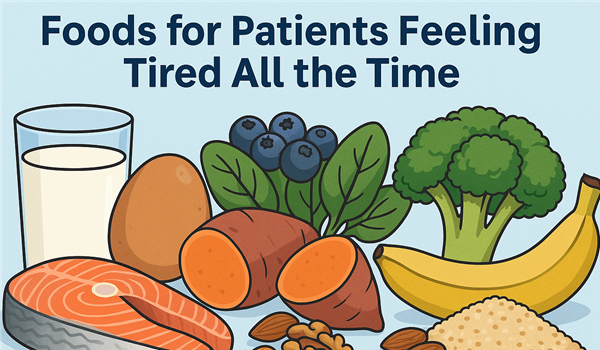foods to boost energy tiredness

Patient Information Leaflet: Food to Help with Tiredness and Low Energy
Kensington Medical Centre – Belfast
⸻
Feeling Tired All the Time?
If you feel tired often, your diet may play a role. Eating the right foods can help boost your energy and improve how you feel throughout the day.
⸻
Common Causes of Tiredness
• Poor sleep
• Stress or low mood
• Not eating enough or skipping meals
• Low iron or vitamin levels (like B12, vitamin D, or folate)
• Dehydration
• Long-term medical conditions (speak to your GP if tiredness is ongoing)
⸻
Energy-Boosting Foods
1. Wholegrains
Provide long-lasting energy.
Examples: oats, brown rice, wholegrain bread and pasta
2. Iron-Rich Foods
Help carry oxygen in your blood, reducing fatigue.
Examples: red meat, lentils, spinach, fortified cereals
3. Protein-Rich Foods
Help build and repair your body and keep energy levels steady.
Examples: chicken, eggs, fish, beans, tofu, yoghurt
4. Fruits and Vegetables
Packed with vitamins, minerals, and antioxidants to support your body.
Examples: oranges, bananas, berries, leafy greens, carrots
5. B Vitamins (especially B12 and folate)
Support energy production and brain function.
Sources: eggs, milk, meat, green vegetables, fortified foods
6. Healthy Fats
Support brain health and energy.
Examples: nuts, seeds, avocado, oily fish (Salmon, Mackerel, Anchovies, Sardines, Herring)
7. Water
Even mild dehydration can cause tiredness. Aim for 6 glasses a day.
In the UK, the recommended daily water intake for adults is:
• About 6 glasses of fluids per day (roughly 1.5 to 2 litres).
This includes water, low-fat milk, and sugar-free drinks, including tea and coffee. More may be needed in hot weather, during exercise, or if you’re unwell. Water is the best choice for staying well hydrated.
⸻
Foods to Limit
• Sugary snacks and drinks – may give a short burst of energy followed by a crash
• Highly processed foods – often low in nutrients
• Too much caffeine – can affect sleep and cause dips in energy later
⸻
Helpful Tips
• Eat regular meals and healthy snacks to keep energy stable
• Start your day with a balanced breakfast
• Stay hydrated throughout the day
• Include iron and B-vitamin rich foods in your diet
• Aim for a mix of protein, healthy carbs, and vegetables in each meal
⸻
When to See a Doctor
Make an appointment with your GP if you:
• Feel tired most days, even after rest
• Have other symptoms like dizziness, mood changes, or memory problems
• Are concerned about your diet or nutrient levels
• Have a long-term condition or take medications that may affect your energy
A blood test can check for issues like anaemia or low vitamin levels.
⸻
For more information, visit www.nhs.uk/live-well
This leaflet is for general information only. Please speak to your healthcare provider for advice specific to you.
Medical Disclaimer
The dietary advice and information provided in this leaflet are for general guidance and educational purposes only. They are not intended to replace personalised advice, diagnosis, or treatment from a qualified healthcare professional.
If you have a medical condition, are taking medication, are pregnant or breastfeeding, or have specific dietary needs or food allergies, you should consult your GP, dietitian, or another healthcare provider before making significant changes to your diet.
Following general dietary recommendations without proper medical supervision may not be suitable for everyone and could result in unintended health effects. Always seek individualised medical advice for your personal health circumstances.
Page created: 01 June 2025